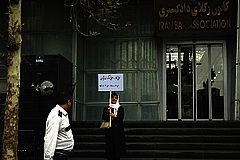Attorney Nasrin Sotudeh Announces End of Sit-in Strike
» In Exclusive Interview With Rooz
Nasrin Sotudeh is a well-known Iranian human rights defense attorney who has seen prison and had her license to practice law revoked. She has been protesting against a three-year ban by the Attorney Disciplinary Court that deprives her of practicing law. Last week, the Court issued a new ruling – reducing the three-year sentence to 9 months, a period that has already passed - that for all practical purposes lifts the suspension of her law license. Speaking to Rooz after the court announcement, when she also ended her months-old sit-in protest in front of the judiciary, she called the new court ruling a “middle road” because she had been demanding the complete revocation of the ruling, not its reduction. She said she was satisfied as this was the result of her sit-in.
Sotudeh was first imprisoned after the 2009 presidential election in Iran when she began to take up defense cases of individuals who had been put behind bars for their protest of the disputed 2009 presidential elections that returned Mahmoud Ahmadinejad to the presidency. She was charged with engaging in propaganda against the state, gathering and conspiring to harm the security of the state and also for being a member of the Iranian Center for the Defenders of Human Rights. Initially, she had been sentenced to 11 years of prison and a 20-year bar to practice law plus a 20-year ban on leaving the country. Her sentence was later commuted by an appeals court to a 6-year suspended prison sentence and a 10-year ban on legal work. She was released from prison in September 2012.
Here are the highlights of the interview.
Rooz: In our previous interview you had said that you would continue your sit-in protest until the complete revocation of the court ruling banning you from work. What do you think now that your ban has been reduced?
Nasrin Sotudeh: If the ruling had been completely revoked, I would have said that I had won. That is what I had wanted. This ruling is a middle of the way. We respect such middle way decisions and do not call them a complete victory or complete defeat for either disputant party. We have had numerous meetings and sessions with bar association authorities regarding the original ruling, but did not come to any conclusions.
Rooz: With the new 9 month ban, how many months are left?
Sotudeh: Two and a half months from the 9 month sentence are left, but I am ending my sit-in protest because a final ruling has been passed.
Rooz: You had earlier said you would never appeal the last ruling, so how come the sentence was reduced? Was this the result of your sit-in?
Sotudeh: The reason for the change in the ruling is that we had requested the application of the new law for the case according to which the court could not pass a 20-year sentence. The revolutionary court accepted my request and reduced the sentence to 2 years. Consequently, the attorney disciplinary court reduced its 3 year practice ban to 9 months. I had not protested or asked for an appeal regarding the practice ban by the disciplinary court. This change in the ban was the result of the change in the original prison sentence.
Rooz: Did your sit-in have anything to do with the ruling change?
Sotudeh: This needs more time for a discussion. I was exercising a fundamental civil right, and specifically the right to peaceful assembly and association given to me by general law and also article 28 of our constitution. This works anywhere in the world so there is no reason why it would not work in Iran. I do not necessarily believe this is the best way to proceed but I have partially received a response to my call.
Rooz: What is next?
Sotudeh: First some research work. I have fallen behind. I shall also continue to do my legal work.
Rooz: What about those who supported you and stood by you in your sit-in protest?
Sotudeh: As an attorney and a civil activist I cannot be indifferent to those who supported my sit-in or those who did not. We must not forget that any person whose rights are violated deserves to be defended more than anybody else. I see this as my duty as well.


